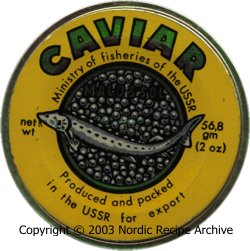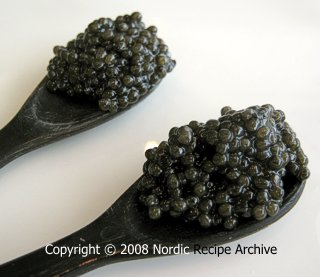
|
|
| MAIN RECIPE PAGE |
|
|
CAVIAR
The king of fish roes is undoubtedly caviar, the salted roe of certain species of sturgeon. Nowadays caviar is mainly made of the roe of European and Asiatic sturgeon species living in the Caspian Sea, but caviar of the lake sturgeons of North America (Acipenser fulvescens) is also available.
In picture on right: old jar lid of Soviet Union produced ossetra caviar. The most prestigious caviars are produced from the eggs of beluga sturgeon (Huso huso), ossetra/Russian sturgeon (Acipenser gueldenstaedtii) and sevruga/stellate sturgeon (Acipenser stellatus), beluga caviar being the rarest and of finest quality and sevruga the most popular and affordable.
In picture on left: black caviar.
In picture on right: champagne and caviar, a classic combination. Good, fresh caviar should be moist, yet not wet nor runny: the individual eggs should be plump, unbroken and separate and the scent must be fresh, not "fishy". Although real caviar does not require any additives, it is best eaten on a lightly buttered toast, perhaps dotted with smetana. Adding onion, lemon, garlic, pepper or any other additives will only destroy the unique flavour. See a recipe for caviar canapés. |
|
|

 Iran and the Soviet Union, up until its breakup, used to manage the caviar production of the fisheries around the Caspian Sea. Today the unregulated fishing and poaching is threatening the survival of the sturgeon species of that area. Thus new caviar producing regions have emerged, eg in Far East Siberia and Manchuria.
Iran and the Soviet Union, up until its breakup, used to manage the caviar production of the fisheries around the Caspian Sea. Today the unregulated fishing and poaching is threatening the survival of the sturgeon species of that area. Thus new caviar producing regions have emerged, eg in Far East Siberia and Manchuria.
 Sturgeon roe is harvested during spawning season. The roe is first separated, cleaned and drained. Then it is processed with pure salt, drained again and packed into tightly sealed tins.
Russian caviar marked Malossol (Russian for "little salt") has the amount of 2,8 - 3,5 % salt in it.
Sturgeon roe is harvested during spawning season. The roe is first separated, cleaned and drained. Then it is processed with pure salt, drained again and packed into tightly sealed tins.
Russian caviar marked Malossol (Russian for "little salt") has the amount of 2,8 - 3,5 % salt in it.
 In Russia, processed fish roe is called ikra, including also caviar. Roe of sturgeons is called black ikra and roe of salmon red ikra, which is also a great delicacy. "Golden caviar" is a name sometimes given to
In Russia, processed fish roe is called ikra, including also caviar. Roe of sturgeons is called black ikra and roe of salmon red ikra, which is also a great delicacy. "Golden caviar" is a name sometimes given to